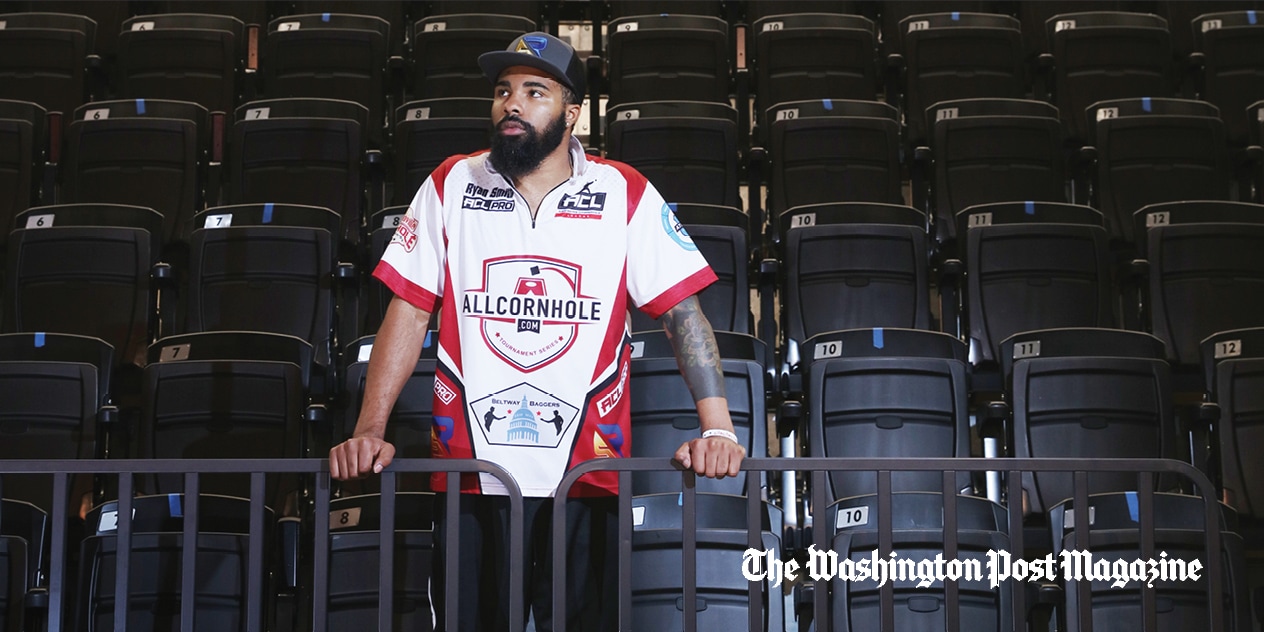Meet one of the nation’s top pro cornhole players. Yes, cornhole.

Smith is a top-ranked player in the American Cornhole League, an organization for professionals — if tailgate games can be considered professional — in its fifth year. The sport’s fan base is growing. (See: Chrissy Teigen, who tweeted about a cornhole match in July 2019, “THIS TOURNAMENT I’m obsessed.”) It was also one of the only sports leagues that kept playing regular games as the pandemic took hold.
Founded by Stacey Moore, its commissioner, the ACL is to cornhole as the NFL is to professional football. While certainly not the only professional cornhole operation in the country — there are at least two others, including the 15-year-old American Cornhole Organization — the ACL is the only one to have games nationally broadcast live on ESPN and ESPN2.
A stout, cleanshaven man from Charlotte who speaks with a pleasant drawl, Moore became convinced in the early 2010s that he could turn cornhole into a legitimate professional sport. “I started seeing people taking cornhole more seriously than any other tailgating games,” he says. “There was some strategy behind it, which wasn’t apparent to me as a casual player.”
He experimented with an early version of the league in 2015, setting up a cornhole championship tour across the Carolinas that drew close to 5,000 players over six months. From there he expanded by establishing relationships with bars across the country that were already running cornhole tournaments. A points system came along in 2016, which was Moore’s attempt at objectively ranking cornhole competitors at the local, regional and national levels.
The league added divisions to differentiate between the casual bargoer and those who are good enough to compete for cash: tailgater (for beginners), intermediate and advanced. In 2017, the ACL organized a pro division. Players who perform well enough in the advanced division are automatically qualified to become ACL pros, which is where the money is. A six-figure pot gets distributed to winners in a series of pro qualifier competitions throughout the year. Last year the pot, funded by business sponsorships, was $180,000. In 2020, it’s $250,000.
“I think the next milestone is for us to have the top 50 percent of our pro players solely focusing on cornhole full time by getting the prize pool to $5 million,” says Moore.
While the American Cornhole League has about 55,000 members, barely 250 of them are money-winning pros like Smith. (ACL pro tournaments are coed.) He competes both individually and in doubles, where teams of two square off. The basic setup is the same for pros and tailgaters. Whether it’s singles or doubles, players stand at opposite ends of a makeshift course next to a sloped wooden board with a hole at the top. Every round, each player gets four bags and four tosses to try to score points.
Points scored each round depend on how well you and your opponent played. If you sink four bags into the hole and your opponent does the same, the points cancel out. If you sink four bags and your opponent sinks three, you get three points for the additional bag you got in the hole. ACL pros usually play up to 21 points, unless they’re competing on live television. To fit broadcast constraints, those matchups are the best of 10 rounds.
In 2019, his first year as a pro, Smith’s doubles team finished 11th. On his own, Smith was ranked 13th. That’s perhaps not surprising given his athletic ability: He played safety and cornerback on James Madison University’s football team. After college, in 2015, his brother took him to a cornhole tournament at a Buffalo Wild Wings in Fredericksburg, Va. For Smith, it brought back memories of the games of horseshoes he played growing up. “I consider myself pretty good at horseshoes,” he says. “So I thought, ‘How hard can this be?’ ”
Pretty hard, it turns out. As Smith recalls, the players in this tournament were consistent in throwing and landing their bags on the board. The good ones were readily sinking bags into the hole. “I thought, ‘D—n, let me buy some bags and boards and figure this thing out,’ ” he says. “It was probably a couple years until I considered myself solid.”
Pro players don’t just chuck bags. Some have a soft, high throw; others have a style that resembles line-drive dingers in baseball. Some ACL pros can effortlessly toss up an “airmail” (that’s a bag that falls easily through the hole), while others prefer to slide the bag into it. You can block an opponent from doing the latter by strategically placing a bag just outside the hole.
Smith’s finesse with blocker bags was on display one afternoon in late June at the Bayfront Convention Center in Erie, Pa. He was playing a pro qualifier match. He took his spot by the board wearing a bandanna face covering, ready to throw. Because of the pandemic, the stands were empty. But all anyone had to do to watch him play was turn on their television.
“It sounds crazy,” Smith says, “but who doesn’t want to play cornhole on ESPN?”
Andrew Zaleski is a writer in Maryland.






